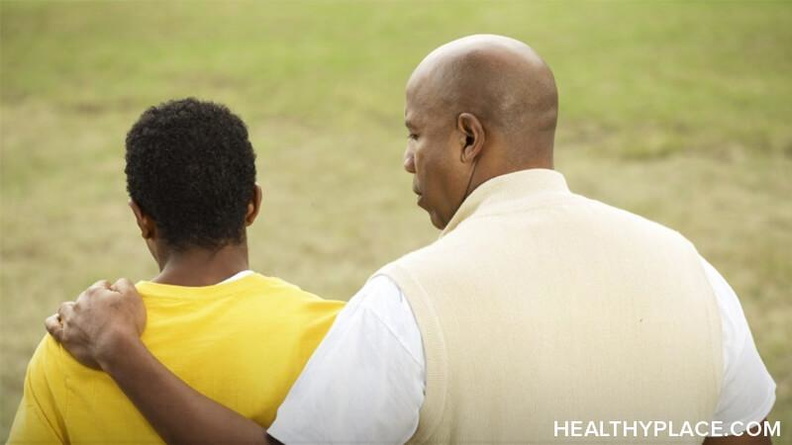How to Talk to Children About Divorce

Important things for parents to consider when talking to your children about divorce.
Divorce can be a traumatic experience for a child. How you talk to your children about divorce can greatly affect how they are impacted by divorce.
- What to expect at this age
- How to talk about it
- What kids ask ... What parents answer
What to Expect from Grade-Schoolers When You Talk About Divorce
For kids of any age, divorce raises big issues: shock, loss, uncertainty. But grade-schoolers often take on another set of burdens as well: feeling guilty, worrying about the welfare of one or both parents, worrying about money, worrying about how friends will react, feeling caught in the middle of parents who are — or might be — feuding. "Kids find themselves right in the middle of their own soap opera," says psychologist Anthony Wolf, in his book Why Did You Have to Get a Divorce and When Can I Get a Hamster? After the initial shock of the news has worn off, be prepared for a full range of reactions. Your child may act spiteful, uncooperative, depressed, or withdrawn. You'll need to be as empathetic as possible to help him get through this major transition.
How to Talk About Divorce with Your Children
Tell him together. Ideally, parents should break the news about the divorce in tandem. Telling your child together avoids confusion — he'll hear only one version of the story — and conveys that it was a mutual decision, so he won't blame one parent for the split. According to Paul Coleman, psychologist and author of How to Say it to Your Kids, there's a more important reason as well: It helps preserve your child's sense of trust in both his parents. If it's not possible or practical to discuss the split as a pair, then the adult who has taken the primary parenting role — the one who makes the child feel safest — should handle this task.
Choose your timing. There are two things to consider when telling your child about an impending divorce. First, make sure the decision is final; he'll be in agony if you try to "prepare him" for a mere possibility by saying, "We're thinking about getting a divorce." Second, when you do decide to tell him, remember that the news will be a big shock, even if you and your spouse have been fighting for months. Your child needs time to let it sink in, and though there's never a "good" time, there are bad times: school days, right before you head off to work or he goes to soccer practice, or right before bed. "When he's suddenly feeling very unsafe and very alone, he'll need you to be there for him," says Wolf. Choose a moment when you'll be with him afterward.
Keep it simple. Don't assume your grade-schooler knows exactly what "divorced" means. A 6-year-old may need a definition that's short and straightforward: "Divorced means Mom and Dad won't live together anymore. But we'll always be your parents, and we'll always love you."
Be honest. Your child needs an explanation for why Mom and Dad won't be together anymore. Without one, your child is likely to blame himself for the divorce, and he may come up with reasons you might never have dreamed of: "Dad got mad because I kept losing my allowance money," "Mom left because I talked back to her," or, "They argued all the time about what my punishments should be — it's all my fault." Your child needs a real reason instead. But he's not ready for all the details, such as "Mom's been fooling around," or "Dad's having a mid-life crisis." You can say, "We weren't happy living together, even though we tried really hard to make things work out. We think it will be better if we aren't together and fighting all the time."
Don't blame your ex. Do all you can to avoid demonizing your former partner in front of your child, even if you are hurt and angry over the breakup. Your child doesn't see the situation the same way you do - she just wants you both to be with her, and she'll be hurt and confused if she hears one of her beloved parents criticizing the other. And remember, she can hear you even when you're not talking to her. Negative comments overheard when you're on the phone with a friend or your attorney can be just as damaging as if you had made them to your child.
Be empathetic. All children grieve over divorce — some openly, some quietly. Give your child a chance to talk by saying, "You feel bad about the divorce, don't you?" Whether he opens up or not, it's good for him to know you understand how he feels. Use empathetic responses even when your child attacks you or your ex with comments like, "Dad's a jerk. It's all his fault," or "You're so mean, of course he left," or "My life was great until the divorce." He's angry, and the easiest way for him to react is to blame someone — often you. Although it can be hard, try not to attack back. Saying something like "I know the divorce has been hard for you" acknowledges that he's having a rough time, and that understanding is what he really needs.
Discuss it often. Be prepared to go over the same questions again and again, for weeks or even months. Divorce is difficult for children to understand and accept, and many harbor strong fantasies that their parents will reunite one day.
What kids ask about divorce and what parents answer
"Why are you getting divorced?" At this age, your child may be able to talk more fully about his feelings, and you can help by discussing emotions as you answer his questions. "Divorce is sad — nobody wants to split up a family. But Mom and Dad don't get along anymore. Grownups sometimes change from when they got married. It wasn't because of you or anything you did. Parents never stop loving their kids, and we'll never stop loving you." It's best to emphasize that the divorce was a mutual decision, but if it's obvious that one parent initiated the breakup, an older child might be ready to hear "Mom/Dad decided to make a fresh start."
"I really miss Mom/Dad." Even if you're relieved that your marriage is over, your child probably is not (unless your partner was very abusive). Let him vent his sadness. Sympathize and remind him about the arrangements for seeing the absent parent. "I know you miss Dad, and he misses you too. Even though you don't always see him, you can call him every day. Remember, Dad isn't far away. You have your own bedroom at his house, and you'll see him every week. And we'll both come to your piano recital and the school play." Depending on your child's relationship with your ex's family, he may also need reassurance on questions like, "Will I still see Grandma and Grandpa? Can I still go to baseball games with Uncle Bill?"
"Who's going to take me to school?" At this age, your child will also be worried about the divorce's impact on his daily life: "Will I still go to my same school? Who gets the dog? Who's going to take me to piano lessons?" They may sound trivial to you, but they're very real concerns for him, so go over the details: "You'll still live here in our house with me. At Dad's/Mom's new house, you'll also have your own bedroom for when you visit." Some children this age may start to worry about whether finances will become a problem — and sometimes they are. Reassure him that you have enough money to live, and though there might be a moratorium on buying new video games, he will have everything he needs.
"Is it okay if you and Dad don't come to our soccer team's playoffs? It's not such a big deal." Grade-schoolers, especially slightly older ones, are sensitive to their parents' perceived feelings, and they worry about being in the middle of what could be a bad scene. They may also just be angry with both parents. Sometimes it's hard to tell what your child is really concerned about; he may worry that you'll be sad or angry at a public function, or that he'll have trouble dividing his attention between two feuding parents. Try to figure out what he's really thinking by gently asking, "Are you feeling upset with Mom and Dad? Or do you just want some time alone with Dad after the big game? That's okay with me. I know he's the one who helped you most with your soccer playing. But if you're afraid that Dad and I will get into a fight at the game, don't worry — we wouldn't do that. We're both happy just to be there watching you play."
"Do you still love me?" Your grade-schooler needs to know that both his parents still love him, and that the divorce wasn't his fault. The lurking question — which even your child may not recognize — is, "Are you going to leave, too?" It's logical for him to think that if one parent can leave, maybe the other can, also. Plus, being separated from a parent, even for short periods of time, is an inevitable reality of shared custody arrangements. Be ready to reassure your child that even though he may be sleeping at Dad's this weekend, Mom is at home waiting for him. Tell him as often as he needs to hear it: " Dad and I will always love you, and we'll always be here to take care of you."
Source: Parentcenter
APA Reference
Staff, H.
(2009, January 11). How to Talk to Children About Divorce, HealthyPlace. Retrieved
on 2026, March 5 from https://www.healthyplace.com/parenting/relationships/how-to-talk-to-children-about-divorce



